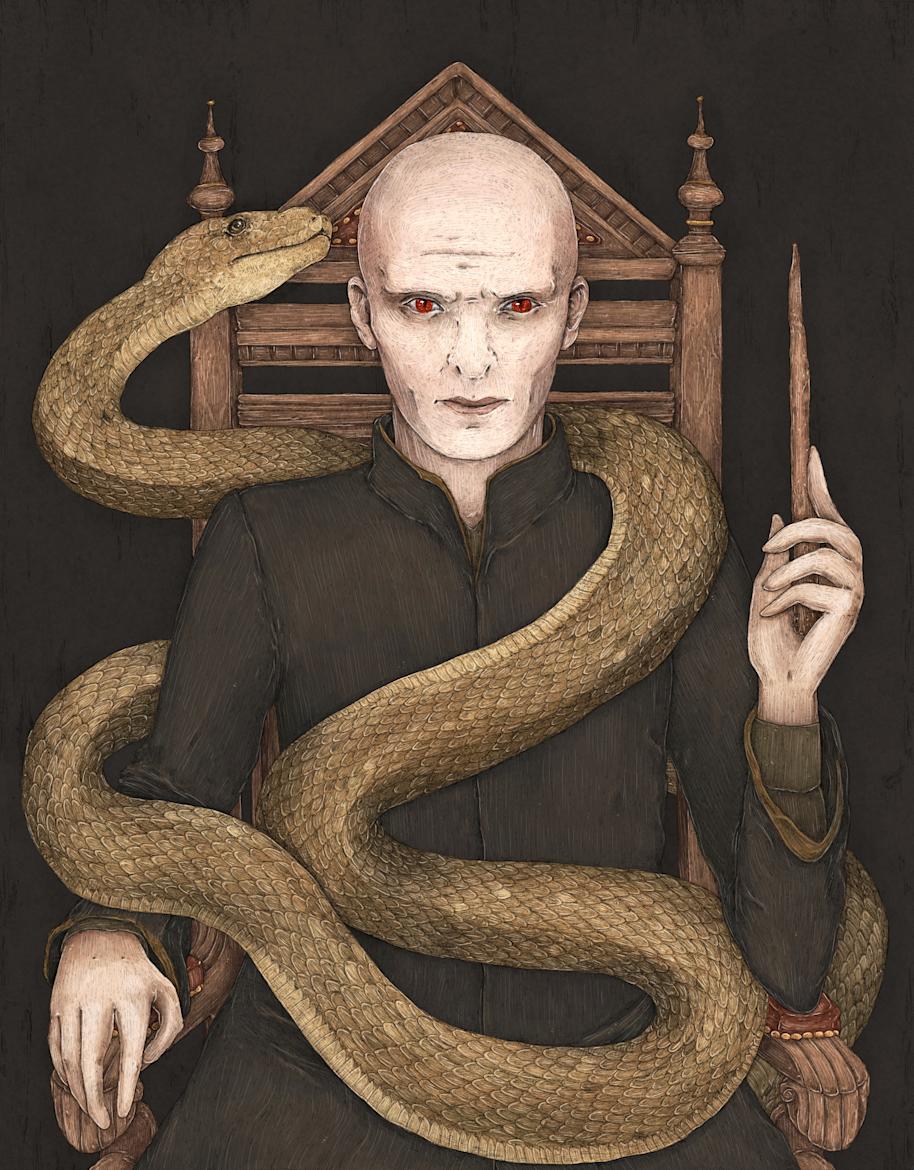
You-Know-Who wasn’t going to feature on any magazine covers or sign any glamorous product endorsements – this side of hell freezing over, anyway. But nonetheless it’s fair to admit – however begrudgingly – that the Dark Lord was kind of a celebrity. He was, and is, stupendously famous. Okay, if you prefer: infamous.
But despite Lord Voldemort’s high profile, and the grim shadow he cast over the affairs of Hogwarts and its inhabitants for decades, there’s still plenty of trivia and offbeat analysis that many people, even Harry Potter fans, might be unaware of.
Here’s a look at the stranger aspects of an already pretty odd character…

His name alone is a whole can of worms
We’re all too familiar with the taboo around saying ‘Voldemort’ aloud, hence his bountiful selection of nicknames. Remember when Minister for Magic Cornelius Fudge refused to say He Who Must Not Be Named’s… er, name… in the office of the Muggle Prime Minister, instead cravenly scrawling it on parchment and sliding it across the desk?
Even Lord Voldemort introducing himself wasn’t quite so simple. It’s hardly a massive spoiler to point out that, in the books, ‘I am Lord Voldemort’ is a nifty anagram of the Dark Lord’s prior name, Tom Marvolo Riddle. But have you ever wondered how that works out for fans reading in other languages? ‘I am’, for instance, translates in French to ‘je suis’.

So what is Voldemort’s given name in France? Wait for it… Tom Elvis Jedusor.
Don’t Be Cruel crooner Elvis Presley would probably be stunned to discover his association with the forces of evil. (By the way, the Danish version is the much racier, if just as incongruous, ‘Romeo G Detlev.’ Wherefore art thou, Dark Lord?)
Back to the French though – J.K. Rowling blew everyone’s minds on Twitter a couple of years ago with the bombshell revelation that the final ‘t’ in Voldemort is silent, as in standard French pronunciation. This actually makes loads of sense, as it’s consistent with the rather poetic idea that the final syllable of his name, ‘mort’ means ‘death’, as it does in the Gallic tongue.

He was driven, intelligent… but also sloppy
Young Voldemort’s bitterness at being refused his favoured career choice as Defence Against the Dark Arts master at Hogwarts not once but twice (by Armando Dippet and later Albus Dumbledore) made him furious, and it was strongly suspected that he jinxed the position in revenge. The upshot of the alleged jinx was that Defence Against the Dark Arts teachers only lasted a maximum of one year in the post.
A generous – to him, anyway – interpretation of this move was that Voldemort was cannily working to undermine the standard of teaching, so that in due course Defence Against the Dark Arts talent would be so lacklustre among the next generation of wizards that the Dark Lord could overcome resistance almost at his leisure. If there was a plan at all, that is.
Or, another often-overlooked angle – several teachers who occupied the post were, to various extents, his ‘plants’. You could argue that point for Snape and to a lesser extent Quirrell all succumbed after a year, when they could have arguably served him better by more actively undermining standards in the classroom, or spying on the more gifted students.
Think he spotted that one?
His arrogance, too, made the Dark Lord sloppy. Voldemort considered house-elves as socially inferior and so he gave them little consideration. But think about it – on two separate occasions their lowly kind got the better of him: when Kreacher deprived him of Salazar Slytherin’s locket, and when Dobby managed to escape imprisonment at Malfoy Manor, enabling his friends to mount what turned into a pretty effective resistance.
For somebody without a nose, he was kind of vain
Ever noticed how he referred to himself in third person (to, at different points, Frank Bryce, Peter Pettigrew and Walden Macnair)? What’s with that?
It was a way of reinforcing his power. As we’ve seen, many others were too terrified to say his name. By uttering it firmly himself he confirmed his dominion over them, and lent credence to his own self-appointed mastery. Didn’t work out so well in the end for him though, did it?

The Dark Lord’s ultimate undoing could be attributed to his vanity, and the oversights that followed from it. Voldemort’s mortal destiny was tied in to the Horcruxes – his only meaningful vulnerability. However, a wizard with sufficient talent could supposedly make a Horcrux out of anything. You-Know-Who deliberately selected objects of personal significance – Rowena Ravenclaw’s diadem, Helga Hufflepuff’s cup, Marvolo Gaunt’s ring – to prop up his own myth-making. Had he not been so vain, and instead chosen, say, a humble pebble on an obscure beach, perhaps he would have prevailed.
For all Voldemort’s undoubted talent, power and courage (remember, even mortal nemesis Harry Potter briefly felt ‘resentful admiration’ for his foe when watching Riddle as a fearless young man in Dumbledore’s Pensieve), it was these obscure, oft-ignored details that ultimately sealed his fate.




